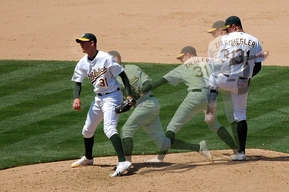 Ah, the signs of spring! We got just a sniff of warmer air in Peoria last week, and all the children are already itching for spring. The robins are back (and in some cases never left!). In the southern states, spring training has already begun for major and minor league baseball teams. After so many months off from the sport, many pitchers are easing gently back into their normal routine of throwing the baseball. They know from long experience that they must take care of their throwing shoulder. Baseball pitchers whip their arm forward in a violent and strenuous motion when releasing the baseball, which, if they aren't careful, can easily damage the muscular structures surrounding the shoulder. The shoulder is the most freely movable joint in the human body. It can rotate in almost every direction, quickly and smoothly. In fact, to call it a joint at all is almost a misnomer: the bones don't really fit well together at all. In order to have optimal range of motion, the ball-and-socket joint is held together by muscles instead of by strong ligaments and bony structures. What the shoulder gains in mobility, however, it loses in stability. The muscles which hold the humerus (the arm bone) onto the body are easily damaged if overused. Some of these muscles have a fancy and famous name: The Rotator Cuff. The Rotator Cuff is a group of four muscles. Each one of these muscles links the humerus to the shoulder blade. These muscles stabilize the shoulder joint, and cause the arm to rise and and to rotate. Most sport-specific arm movements come from these muscles: raising the hand over the head, cocking the arm before throwing, twisting the arm when throwing a curveball, etc. As the diagram shows, these muscles are all quite large by the shoulder blade, but become very thin and ligamentous once they near the humerus. This is the cause of the possible instability. Repetitive motions (throwing too often) or overly forceful motions can cause small tears in the tendons which connect the muscles to the arm bone. Needless to say, this results in a lot of pain and discomfort. The most frequently injured muscle in the rotator cuff is the supraspinatus. This muscle originates at the top of the shoulder blade, and crosses over the top of the humerus. Its job is to lift the arm out to the side. It is most frequently injured by microtrauma (repetitive rubbing on nearby bony structures). Whether you're a major leaguer or just planning on playing a bit of softball this year, make sure to keep good care of your rotator cuff. Throw softly at first. Ice after playing hard. Recent research has shown that stretching, while a good and noble activity to warm up the muscles, does not reduce the likelihood of muscular injury. So please don't expect that a little bit of arm stretching will automatically protect you from rotator cuff injury. Whatever your activity level is, remember that the phrase "no pain, no gain" is quite often wrong. If you begin to feel pain on the top of the shoulder during a repetitive activity, stop immediately and ice the affected area. Contact your friendly local Peoria Activator doctor with any questions. Batter up!
2 Comments
2/23/2011 03:05:27 am
Excellent article on the shoulder. I especially appreciate you including the fact that static stretching does not prevent injury -- a rarely know fact.
Reply
2/23/2011 04:02:31 am
Thanks for stopping by, Dr. Bockmann! I appreciate your comments.
Reply
Your comment will be posted after it is approved.
Leave a Reply. |
Categories
All
DisclaimerUnless otherwise attributed, all content is written by Kyle Johnson, DC, of Johnson Family Chiropractic of Peoria.
All images used are under Creative Commons license. Although every effort has been made to provide an accurate description of our chiropractic care and its benefits, the information given on this website and blog is not intended to be, nor should it be interpreted as, medical advice for any condition. If you have any questions regarding your condition, you should seek the help of Dr. Johnson in person, so that he may properly assess your condition. This blog is provided by Johnson Family Chiropractic of Peoria, S.C., proudly located in Peoria, IL. |
Activator Methods | Webster Technique | Testimonials | Meet Dr. Johnson | Blog | Contact Us | ©2023 Johnson Family Chiropractic of Peoria, S.C.
3227 N. Prospect Rd.
Peoria, IL 61603
(309) 688-8773
3227 N. Prospect Rd.
Peoria, IL 61603
(309) 688-8773

 RSS Feed
RSS Feed